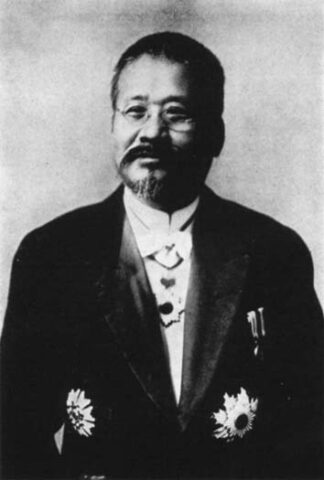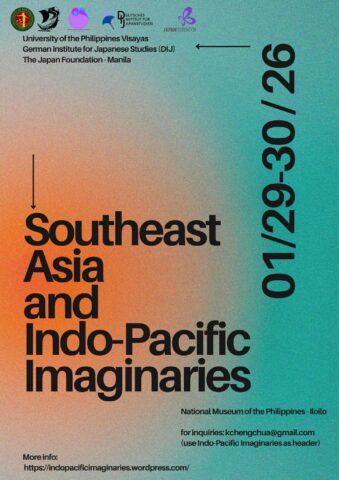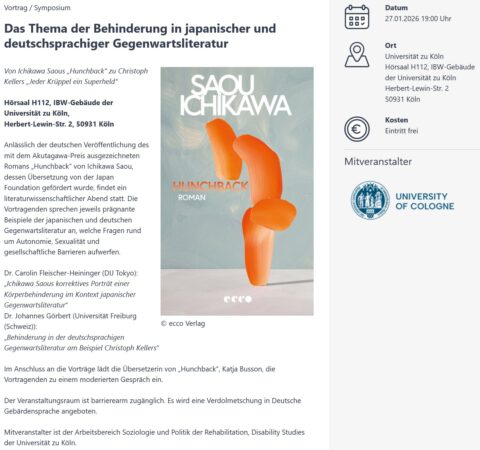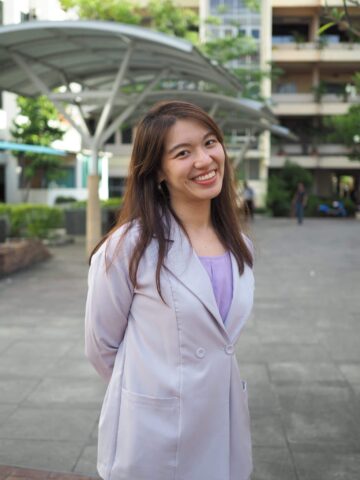Events and Activities
DIJ co-hosts symposium on animal welfare at Nichibunken

Together with the International Research Center for Japanese Studies in Kyoto (Nichibunken), the DIJ will co-host the international symposium The Current State of Animal Welfare Movement Research (main language: Japanese) on February 14-15. It aims to explore the animal welfare movement in Japan from multiple perspectives, including ethics, history, and society. The term “animal welfare movement” here refers to all social activities aimed at human-animal coexistence, improving animal treatment, protection, and legal recognition. Four researchers from Japan and abroad, including DIJ sociologist Barbara Holthus (“The Sociology of Humans and Pets: Happiness, Loneliness, Multispecies Families”, in Japanese), will give presentations to examine human efforts concerning animal treatment under the umbrella term “animal welfare movement,” re-examining the nature of human-animal relationships. Participation in the symposium is only possible online.
DIJ Roundtable on recruitment and training strategies

Japan is a highly attractive, but difficult market for multinational companies. Their presence is by far the lowest among the OECD when measured by the stock of foreign direct investment relative to GDP. One of the biggest hurdles is the recruitment of qualified personnel. What strategies do foreign companies in Japan pursue to address the human resource challenge? To what extent do their strategies incorporate practices applied in their home market? This DIJ Roundtable presents findings from interviews with 25 experts from the field of human resource management in ten German companies in Japan. The presentation by Matthias Pilz will be followed by a panel discussion with Shigeki Egami and Carolina Kawakubo, moderated by Franz Waldenberger, a Q&A session, and a networking reception. Details and registration here
Hybrid Study Group on Haga Yaichi and the Imagination of National Identity

In 1907, amidst the national triumph following the Russo-Japanese War and the domestic unrest symbolised by the Hibiya riots, Haga Yaichi published Kokuminsei jūron [Ten Essays on National Character]. As an heir to the kokugaku tradition, a “father” of Japan’s literary canon, and a transmitter of German philology, Haga identified ten characteristics of the Japanese people in this widely circulated volume. While scholars in the 1970s embraced it as a precursor to nihonjinron, recent scholarship has reinterpreted it primarily as a tool of governmental suppression. This presentation challenges both interpretations through a close reading and contextual analysis. It aims to expand our understanding beyond familiar themes of imperial loyalism or agrarian nostalgia, reframing kokuminsei as a dynamic site of identity production. Details and registration here
DIJ researchers at ‘Southeast Asia and Indo-Pacific Imaginaries’ conference
 The present geopolitical landscapes are shifting, with global powers realigning their strategies. The Free and Open Indo-Pacific (FOIP), a concept proposed by then Prime Minister Shinzo Abe, aims at promoting peace and prosperity in the region, particularly in the fields of fundamental values, economic prosperity, and peace and stability. Southeast Asia has been one center of this strategy with a particular focus on maritime security and safety. The conference Southeast Asia and Indo-Pacific Imaginaries takes an interdisciplinary approach to study FOIP strategies. It features two DIJ panels, including research papers by David M. Malitz (“Japanese-Indian Relations and the Imaginations of an Indo-Pacific Region”) and Dolf-Alexander Neuhaus (“Developmental Imaginaries: Japan’s Educational Aid Programs and the Shaping of the Indo-Pacific Order”). The conference is co-hosted by University of the Philippines – Visayas, the Japan Foundation Manila, and the DIJ and takes place 29–30 January 2026 at the National Museum of the Philippines, Iloilo.
The present geopolitical landscapes are shifting, with global powers realigning their strategies. The Free and Open Indo-Pacific (FOIP), a concept proposed by then Prime Minister Shinzo Abe, aims at promoting peace and prosperity in the region, particularly in the fields of fundamental values, economic prosperity, and peace and stability. Southeast Asia has been one center of this strategy with a particular focus on maritime security and safety. The conference Southeast Asia and Indo-Pacific Imaginaries takes an interdisciplinary approach to study FOIP strategies. It features two DIJ panels, including research papers by David M. Malitz (“Japanese-Indian Relations and the Imaginations of an Indo-Pacific Region”) and Dolf-Alexander Neuhaus (“Developmental Imaginaries: Japan’s Educational Aid Programs and the Shaping of the Indo-Pacific Order”). The conference is co-hosted by University of the Philippines – Visayas, the Japan Foundation Manila, and the DIJ and takes place 29–30 January 2026 at the National Museum of the Philippines, Iloilo.
Vortrag von Carolin Fleischer-Heininger zu Behinderung in japanischer Gegenwartsliteratur

Im Jahr 2023 gewann der Roman „Hunchback“ von Ichikawa Saou den renommierten Akutagawa-Preis, jetzt liegt er in deutscher Übersetzung vor. Aus diesem Anlass veranstaltet das Japanische Kulturinstitut Köln zusammen mit dem Arbeitsbereich Soziologie und Politik der Rehabilitation, Disability Studies der Universität Köln den literaturwissenschaftlichen Abend “Das Thema der Behinderung in japanischer und deutschsprachiger Gegenwartsliteratur: Von Ichikawa Saous „Hunchback“ zu Christoph Kellers „Jeder Krüppel ein Superheld“. Die zwei Vortragenden sprechen prägnante Beispiele der japanischen und deutschen Gegenwartsliteratur an, die Fragen rund um Autonomie, Sexualität und gesellschaftliche Barrieren aufwerfen. Zu Japan spricht DIJ-Literaturwissenschaftlerin Carolin Fleischer-Heininger („Ichikawa Saous korrektives Porträt einer Körperbehinderung im Kontext japanischer Gegenwartsliteratur“). Im Anschluss an die Vorträge lädt die Übersetzerin von „Hunchback“, Katja Busson, die Vortragenden zu einem moderierten Gespräch ein. Der Veranstaltung findet am 27. Januar an der Universität Köln statt. Es wird eine Verdolmetschung in Deutsche Gebärdensprache angeboten.
Hybrid Workshop on Machizukuri and Adaptive Governance in Hita

This hybrid bilingual workshop focuses on local initiatives in response to the current challenges facing regional Japan, exemplified by the city of Hita in Ōita Prefecture. The event combines the perspectives of two scholars on this area in Northern Kyushu and one practitioner from the field. It addresses aspects of local resilience in times of disruption and postgrowth. The speakers illustrate two different revitalization approaches, displaying the merits and limitations of tourist-based machizukuri, or “town-making” activities. The aim of the workshop is to critically engage in a discussion about adaptation processes in rural Japan. Investigating the same region from three different angles promises a more nuanced understanding of social dynamics and societal change. After the three presentations, a panel discussion including Q&A will conclude the event. Details and registration here
Hybrid DIJ Study Group on the Political Economy of U.S. Military Bases
 This talk provides an overview of the economic and political impacts of the presence of U.S. military bases in Japan. International relations research has traditionally examined U.S. bases qualitatively, treating them as an outcome of U.S. global security strategy. In contrast, military economics focus on the economic effects of base closures and realignments in the United States and Europe. Studies examining the impact of U.S. bases on Japan remain scarce. This research addresses this gap by presenting the historical and strategic background of U.S. bases in Japan, alongside empirical evidence and case studies that illustrate the effects of these bases on surrounding communities. The project employs a mixed-methods design and explores the relationship between U.S. bases and Japanese municipalities using the original dataset “The United States Bases in Japan”, which draws on a wide range of primary and secondary sources. Details and registration here
This talk provides an overview of the economic and political impacts of the presence of U.S. military bases in Japan. International relations research has traditionally examined U.S. bases qualitatively, treating them as an outcome of U.S. global security strategy. In contrast, military economics focus on the economic effects of base closures and realignments in the United States and Europe. Studies examining the impact of U.S. bases on Japan remain scarce. This research addresses this gap by presenting the historical and strategic background of U.S. bases in Japan, alongside empirical evidence and case studies that illustrate the effects of these bases on surrounding communities. The project employs a mixed-methods design and explores the relationship between U.S. bases and Japanese municipalities using the original dataset “The United States Bases in Japan”, which draws on a wide range of primary and secondary sources. Details and registration here
Hybrid DIJ Study Group on Industrial Policy and Technology Transfer in Postwar Japan

Was the postwar economic miracle a result of the Japanese government’s industrial policy, or did it occur despite it? Numerous studies on the effects of government policy on industrial growth have produced contradictory or inconclusive findings. In this talk, Krautter argues that one of the main instruments of industrial policy toward growth industries was the licensing system for technology imports. Focusing on technology policy, he finds that the licensing system positively influenced the terms and conditions of technology imports. Krautter contends that the government’s role in postwar industrial development was more that of a coordinator rather than of a “leader” or “guide.” This view is reflected in the description of the Japanese state as a coordination state, contrasting with the well-known concept of the developmental state. Details and registration here





 Open Access
Open Access
